2015
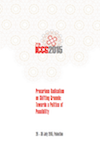
The Digital Toolbox of Social Movements – Social Media vs. Online Mapping
Specht, DougConference paper
International Conference of Critical Geography, Precarious Radicalism on Shifting Grounds: Towards a Politics of Possibility, Ramallah, Palestine, 2015
@conference{nokey,
title = {The Digital Toolbox of Social Movements – Social Media vs. Online Mapping},
author = {Doug Specht},
year = {2015},
date = {2015-07-15},
address = {Ramallah, Palestine},
organization = {International Conference of Critical Geography},
series = {Precarious Radicalism on Shifting Grounds: Towards a Politics of Possibility},
keywords = {},
pubstate = {published},
tppubtype = {conference}
}
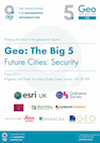
Geo: The Big 5. Future cities, Security
Specht, Doug (Ed.)Conference paperVideo
Association for Geographic information, Kings Way Hotel, London, UK, 2015
@conference{nokey,
title = {Geo: The Big 5. Future cities, Security},
editor = {Doug Specht},
url = {https://www.youtube.com/watch?v=1byNIcXKBI0},
year = {2015},
date = {2015-07-09},
urldate = {2015-07-09},
address = {Kings Way Hotel, London, UK},
organization = {Association for Geographic information},
abstract = {In my role as Conference Chair I presented the opening and closing remarks for the AGI Future Cities Conference drawing upon a broad range of urban studies literature, cinema, dystopian novels and the work presented in the panel sessions.},
keywords = {},
pubstate = {published},
tppubtype = {conference}
}
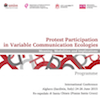
Tools of Resistance: Using maps and social media to create spaces of protest around the extractive sector in Colombia
Specht, DougConference paper
Protest Participation in Variable Communication Ecologies. Meanings, Modalities and Implications. International Conference, Alghero, Sardinia, Italy, 2015
@conference{nokey,
title = {Tools of Resistance: Using maps and social media to create spaces of protest around the extractive sector in Colombia},
author = {Doug Specht},
year = {2015},
date = {2015-06-25},
address = {Alghero, Sardinia, Italy},
series = {Protest Participation in Variable Communication Ecologies. Meanings, Modalities and Implications. International Conference},
abstract = {Colombia’s internet connectivity has exploded over the last four years. Colombia has also “opened for business”, leading to an influx of extractive projects to which many social movements objected heavily. Studies on the role of digital medias within this kind of political mobilisation in developing countries are still relatively scarce. This paper, using document and theoretical analysis, interviews, surveys, GIS and content analysis from social media, examines the role of social media and geo-tagged uploads in protest movements and to what extent increased digital connectivity has helped spread knowledge about human rights and environmental issues, and how geospatial information helps to codify and legitimize this information. Results show that the use of social media in Colombia is still embryonic and hindered by strong hierarchical power structures within social movements, meaning its effect on political mobilisation is often limited, or negative. This implies that social media do not spontaneously produce non-hierarchical knowledge structures, and that social movement organisations in Colombia need to further develop their knowledge dissemination strategies. The study goes on to ask whether it is then the geolocation of knowledge rather than solely the much lauded social media that will help legitimize knowledge around human rights and environmental abuses associated with the extractive industries in a way that moves beyond documenting abuses and towards holding those responsible to account.},
keywords = {},
pubstate = {published},
tppubtype = {conference}
}

Using VGI and UGC to Document human rights abuses
Specht, DougConference paper
Geospatial World Forum, Lisbon, Portugal, 2015
@conference{nokey,
title = {Using VGI and UGC to Document human rights abuses},
author = {Doug Specht},
year = {2015},
date = {2015-05-27},
address = {Lisbon, Portugal},
organization = {Geospatial World Forum},
keywords = {},
pubstate = {published},
tppubtype = {conference}
}
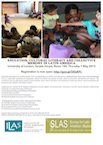
Neogeography and the insurrection of knowledges
Specht, DougConference paper
Education, Cultural Literacy and Collective Memory in Latin America, ILAS, University of London, UK, 2015
@conference{nokey,
title = {Neogeography and the insurrection of knowledges},
author = {Doug Specht},
year = {2015},
date = {2015-05-07},
address = {ILAS, University of London, UK},
series = {Education, Cultural Literacy and Collective Memory in Latin America},
abstract = {New developments within ICT’s are, suggests Foucault, able to invert previous metaphors of the panopticon, with these new information technologies allowing for the challenging of elites. While this notion is subject to continuous debate, one such field where this inversion has been stark has been within the production of maps. Maps and spatial representations produced by local people have a long history, yet in the last ten years the field of cartography has moved in directions unimaginable just 20 years ago. Cartography, through increased access to digital platforms, has been slipping from the control of the powerful bourgeoisie bringing about the creation of ‘neogeography’ and the democratisation of participation. This in turn has created the potential for an ‘insurrection of knowledges’ in which GIS platforms allow for the expression of a variety of knowledges creating a more level playing field for comparing consensus and division. In turn allowing for a wider exploration of the cultural and political conditions that direct human understandings of the environment. These ‘counter-maps’ which express local knowledges in cartographic form can be a powerful tool in promoting the rights of communities. This paper seeks to show the ways in which they have been used in Latin America to go beyond spatial representations and towards eliciting competing localities and grounded truths which enunciate and draw conflict to the centre of attention.},
keywords = {},
pubstate = {published},
tppubtype = {conference}
}
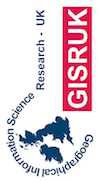
GIS, Big Data and Lessons from John Snow
Specht, DougConference paper
GISR-UK, University of Leeds, UK, 2015
@conference{nokey,
title = {GIS, Big Data and Lessons from John Snow},
author = {Doug Specht},
year = {2015},
date = {2015-04-23},
address = {University of Leeds, UK},
organization = {GISR-UK},
keywords = {},
pubstate = {published},
tppubtype = {conference}
}
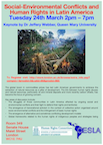
Digital Resistance: The use of Maps and Social Media in protesting large scale mining projects in Latin America
Specht, DougConference paper
Social-Environmental Conflicts and Human Rights in Latin America, ILAS, University of London, UK, 2015
@conference{nokey,
title = { Digital Resistance: The use of Maps and Social Media in protesting large scale mining projects in Latin America},
author = {Doug Specht},
year = {2015},
date = {2015-03-12},
address = {ILAS, University of London, UK},
series = {Social-Environmental Conflicts and Human Rights in Latin America},
abstract = {As peace comes to Latin America, the continent has been inundated with a new wave of invaders who seek to exploit the vast tracks of land and rich mineral resources, often at the expense of local populations. This has manifest itself in an influx of extractive projects to which many social movements have objected heavily. Studies on the role of digital media in these political mobilisations and in developing countries are still scarce. Using document and theoretical analysis, interviews, surveys, GIS and content analysis from social media, this study examines the role of digital and social media in protest movements from Colombia and El Salvador and explores the extent to which increased digital connectivity can help spread knowledge about human rights and environmental issues. Results show that the use of social media is still embryonic and hindered by strong hierarchical power structures within social movements, meaning its effect on political mobilisation is often limited, or negative. This implies that social media do not spontaneously produce non-hierarchical knowledge structures, and that may be a need to further develop knowledge dissemination strategies. The study goes on to ask whether it is then community mapping, rather than the much lauded social media, that will help legitimize knowledge around human rights and environmental abuses associated with the extractive industries in a way that moves beyond documenting abuses and towards holding those responsible to account.},
keywords = {},
pubstate = {published},
tppubtype = {conference}
}
2014
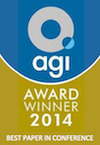
Securing Human and Environmental Rights with PGIS
Specht, DougConference paper
Association for Geographic Information, GeoCom, Warwick, UK, 2014
@conference{nokey,
title = {Securing Human and Environmental Rights with PGIS},
author = {Doug Specht},
year = {2014},
date = {2014-11-01},
address = {Warwick, UK},
organization = {Association for Geographic Information},
series = {GeoCom},
abstract = {Maps have been shown to be an incredibly important resource, especially in the environmental sector, but the costs are often prohibitive to their creation. This research is examining how publicly created online maps are able to support human rights and environmental justice. How do we open up mapping products to enable the worlds poor and grassroots movements to be able to create maps that support their causes, and thus giving them a bigger voice, and legitimizing their knowledge within the Development sector.},
keywords = {},
pubstate = {published},
tppubtype = {conference}
}
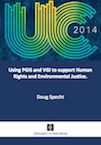
Using PGIS and VGI to support Human Rights and Environmental Justice
Specht, DougConference paper
Esri UC, San Diego, USA, 2014
@conference{nokey,
title = {Using PGIS and VGI to support Human Rights and Environmental Justice},
author = {Doug Specht},
year = {2014},
date = {2014-07-01},
address = {San Diego, USA},
organization = {Esri UC},
abstract = {Maps have been shown to be an incredibly important resource, especially in the environmental sector, but the costs are often prohibitive to their creation. This research is examining how publicly created online maps are able to support human rights and environmental justice. How do we open up mapping products to enable the worlds poor and grassroots movements to be able to create maps that support their causes, and thus giving them a bigger voice.},
keywords = {},
pubstate = {published},
tppubtype = {conference}
}
